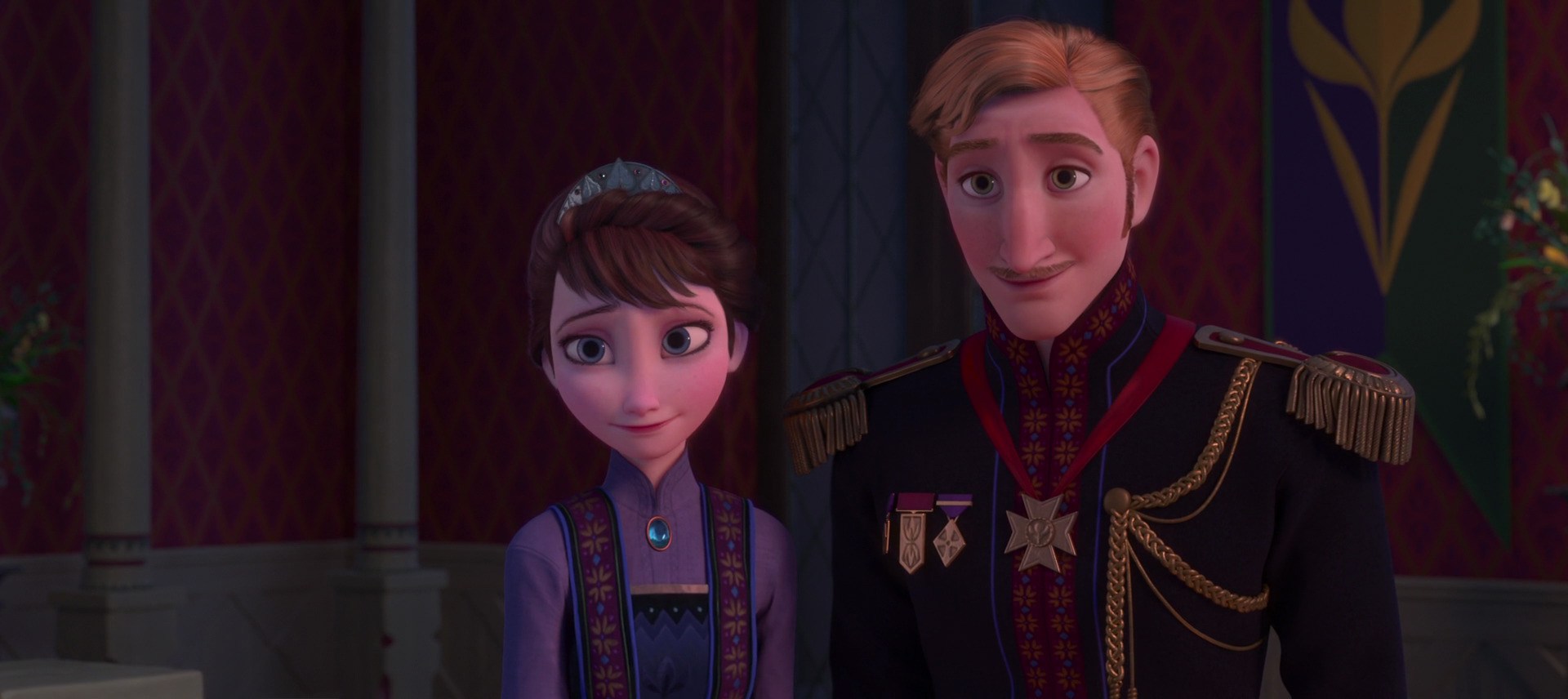A LERT
CONCERNING CERTAIN SPOILERS
WHICH MAY OR MAY NOT BE AHeAD
AND WHICh MAY THREATEN THE NAIVETE
OF THOSE WHO HAVE NOT SEEN THE FILM
WHICH IS THE SUBJECT OF THIS LERT
I'm growing rather fond of my little spoiler alert. Thanks, N.D. Wilson.
All right! Now I've dealt with the conspiracy, it's time for my thoughts on the film itself. Because you're all dying to know, right? WHAT DOES CATIE SAY? AM I GOING TO BE JUSTIFIED IN MY OPINION OF THIS FILM UNTIL CATIE GIVES HERS? (I always wonder why we bloggers think our opinions matter so much. anyway) AHEM.
Be warned. Philosophical nonsense ahead. Slippery ground, folks (You're not laughing. Get it? slippery? ice? eh).
I love the characters. I like the music. The animation is lovely. However, what impressed me most was the plot. It's not epic*, and it's not too sweet. I prefer my tea without sugar, thank you.
I was concerned for the message of the movie when said dear friend performed 'Let It Go" during a nightlong sing/talk/giggle party. She did an excellent job, by the way.Whether or not I threatened to drop an Omnibus textbook on her toe during the chorus will remain unsaid. It was exam week, for goodness's sake!** The song seemed to express a rather modern notion of retreating into oneself to find peace, happiness, whatever, and 'letting go' of societal (and often moral) restraints. "No right, no wrong, no rules for me. I'm free!"
If that was all the movie had to say, it was worth an eye-roll, and that was it.
BUT IT WASN'T. I was shocked. Flabbergasted. And rather pleased.
In my Omnibus class, we have been discussing (actually it consists mostly of the illustrious Mr. Sumpter lecturing while I yawn and burn my tongue while guzzling Earl Grey--7 that's a.m. for ya) the concept of the 'true self' and the 'false self.' The false self is our twisted nature, and our self-image--what we want others to see. In a word, hypocrisy.
I have heard multiple thoughts on hypocrisy, from multiple sources. Pascal is my favorite. Most people agree that hypocrisy is not recommendable, but often the only solution offered is 'to just be yourself.'
Hold on a minute. Not only did you just split an infinitive, but what if I don't like myself? What if my self is messed up? In this post the author made a rather uncomfortable point--we're twisted.
Thus, 'the real me' isn't likely to be someone very nice.
Frozen illustrated this wonderfully. Elsa tries to conceal her power her whole life, trying to be a 'good girl' all by herself. She shuts everyone out, because, as C.S. Lewis so eloquently said,
She trying to keep her family, and herself, safe by keeping away from everyone. "Conceal; don't feel. Put on a show." Until Coronation Day finds her minus one glove. oops. Or perhaps, might we say, minus one cup of coffee, or night of sleep, or ____ (insert anything used to make one sociable).
In "Let It Go," Elsa is rejecting her false self, her avatar.
There is triumph in finally letting go of one's image, and it's a valuable experience...
In class, Mr. Sumpter presented to us the 3 Ps of Power, Possessions, and Prestige. People are slaves to them to preserve their self-image--Mr. Merdle in Little Dorrit, for example. Or Gollum. Or Fanny Dashwood. Or any politician you can think of. Unfortunately, rejecting one's facade isn't enough.
Frozen didn't. "Let It Go" is only one stage of Elsa's progression. But before I spend too much time on stage 3, let's go to everyone's favourite royal redhead...
...because, in her own way, Anna is doing exactly what Elsa did. Because her sister won't love her, she seeks companionship in other places. Elsa retreats further into herself, and Anna looks further and further away for satisfaction--first to her dolls, no doubt, the the pictures on the walls (la! another rhyme!), and finally, Mr. Willoughby. I mean Hans. It's the difference between the introvert and the extrovert--they have opposite reactions to the same problem.
Back to Elsa. She isolates (get it? Ice-o-lates? I think the song made that one already) herself in her castle, thinking she's 'alone and free.' She seeks freedom within herself. In Omni we've been discussing the difference between Christian, Trinitarian freedom and unitarian, 'loner god' freedom. In the latter case the freedom is individualistic--I'm free to do what I want. I am independent. Liberty, equality, fraternity. Long live the rights of man (and woman).
In Trinitarian freedom, I'm free to serve others; I'm free because I'm dependent. I'm a slave to love. The Christian God, in three Persons, is able to love Himself selflessly. I know. My brain just exploded, too. Mop it up and let's continue. But first I need some carrots (behind you there). They're good for my brain--what's left of it, anyway. Good for noses as well.
What amazed me so much in Frozen was, they seemed to get it.
*Odyssey-epic here
**and don't you think a Martin Luther version of that song should be composed? "Here I stand" and all that
* agape, unconditional love--found perfectly only in God
I was concerned for the message of the movie when said dear friend performed 'Let It Go" during a nightlong sing/talk/giggle party. She did an excellent job, by the way.Whether or not I threatened to drop an Omnibus textbook on her toe during the chorus will remain unsaid. It was exam week, for goodness's sake!** The song seemed to express a rather modern notion of retreating into oneself to find peace, happiness, whatever, and 'letting go' of societal (and often moral) restraints. "No right, no wrong, no rules for me. I'm free!"
If that was all the movie had to say, it was worth an eye-roll, and that was it.
BUT IT WASN'T. I was shocked. Flabbergasted. And rather pleased.
In my Omnibus class, we have been discussing (actually it consists mostly of the illustrious Mr. Sumpter lecturing while I yawn and burn my tongue while guzzling Earl Grey--7 that's a.m. for ya) the concept of the 'true self' and the 'false self.' The false self is our twisted nature, and our self-image--what we want others to see. In a word, hypocrisy.
I have heard multiple thoughts on hypocrisy, from multiple sources. Pascal is my favorite. Most people agree that hypocrisy is not recommendable, but often the only solution offered is 'to just be yourself.'
Hold on a minute. Not only did you just split an infinitive, but what if I don't like myself? What if my self is messed up? In this post the author made a rather uncomfortable point--we're twisted.
Thus, 'the real me' isn't likely to be someone very nice.
Frozen illustrated this wonderfully. Elsa tries to conceal her power her whole life, trying to be a 'good girl' all by herself. She shuts everyone out, because, as C.S. Lewis so eloquently said,
“To love at all is to be vulnerable. Love anything and your heart will be wrung and possibly broken. If you want to make sure of keeping it intact you must give it to no one, not even an animal. Wrap it carefully round with hobbies and little luxuries; avoid all entanglements. Lock it up safe in the casket or coffin of your selfishness. But in that casket, safe, dark, motionless, airless, it will change. It will not be broken; it will become unbreakable, impenetrable, irredeemable. To love is to be vulnerable.”
I immediately thought of this quote when I saw Elsa's frozen room in "Do You Wanna Build a Snowman?"She trying to keep her family, and herself, safe by keeping away from everyone. "Conceal; don't feel. Put on a show." Until Coronation Day finds her minus one glove. oops. Or perhaps, might we say, minus one cup of coffee, or night of sleep, or ____ (insert anything used to make one sociable).
 |
| A nod to the similarity between Frozen and S& S |
In "Let It Go," Elsa is rejecting her false self, her avatar.
"The wind is howling like this swirling storm inside
couldn't keep it in; Heaven knows I've tried....
I don't care what they're going to say!
Let the storm rage on; the cold never bothered me, anyway."
"It's funny how some distance makes everything seem small
and the fears that once controlled me can't get to me at all!"
In class, Mr. Sumpter presented to us the 3 Ps of Power, Possessions, and Prestige. People are slaves to them to preserve their self-image--Mr. Merdle in Little Dorrit, for example. Or Gollum. Or Fanny Dashwood. Or any politician you can think of. Unfortunately, rejecting one's facade isn't enough.
"No right, no wrong, no rules for me--I'm free!"
is not a valid conclusion. Most movies, however, would have stopped there, frozen in an individualistic ice castle of independence.Frozen didn't. "Let It Go" is only one stage of Elsa's progression. But before I spend too much time on stage 3, let's go to everyone's favourite royal redhead...
"For the first time in forever I won't be alone. I can't wait to meet everyone!"
...needless to say, Anna's method didn't work out either. Back to Elsa. She isolates (get it? Ice-o-lates? I think the song made that one already) herself in her castle, thinking she's 'alone and free.' She seeks freedom within herself. In Omni we've been discussing the difference between Christian, Trinitarian freedom and unitarian, 'loner god' freedom. In the latter case the freedom is individualistic--I'm free to do what I want. I am independent. Liberty, equality, fraternity. Long live the rights of man (and woman).
In Trinitarian freedom, I'm free to serve others; I'm free because I'm dependent. I'm a slave to love. The Christian God, in three Persons, is able to love Himself selflessly. I know. My brain just exploded, too. Mop it up and let's continue. But first I need some carrots (behind you there). They're good for my brain--what's left of it, anyway. Good for noses as well.
What amazed me so much in Frozen was, they seemed to get it.
"I'm such a fool! I can't be free
no escape from the storm inside of me!
I can't control the curse!"
Elsa finds her true self after she abandons her scheme of independence. Turns out that her selfish letting go was not any more real than her good girl facade. Elsa learns to love, and then she's able to conquer 'the storm,' and use her power for good.
"'I don't even know what true love is.'
'I do. That's when you put someone else's needs before your own.'"
Anna learns that true love isn't necessarily romantic--it's a decision, and she finally stops fantasising about Prince Charming. The sisters learn to love each other, and Elsa is finally free, but in a completely different way.
Being so similar in personality to a character as I am to Elsa is more uncomfortable than anything else I can think of, apart from theater seats. It's been embarrassing to me to see how often I behave just like her without even realising it. What if, say, Elsa had the power of writing, or rhetoric, or ___(insert talent), instead of ice? Words can hurt worse than any old icicle, and they can create personal flurries for people as well.
Me: (while reading a criticism of my work) "Oh look! I've been impaled."
Power is dangerous. Repressed power is dangerous and highly explosive. Self-centered power is even more dangerous. Power, used for true love*, is glorious.
That's what I saw in Frozen. Perhaps I'm being philosophically nonsensical, as usual, but I enjoy being that way. And I daresay it's better than frowning at everything, or just giggling at everything. Don't you think?
**and don't you think a Martin Luther version of that song should be composed? "Here I stand" and all that
* agape, unconditional love--found perfectly only in God







